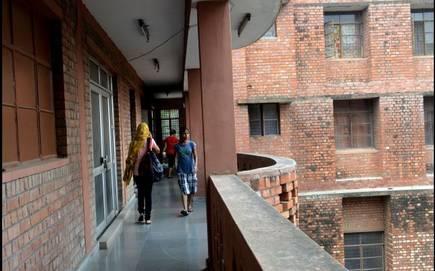PM Modi's Agenda for First 100 Days Will Only Push Privatisation and Centralisation in Higher Education

Image courtesy: The Hindu Business Line
Prime Minister Narendra Modi's education agenda for the first 100 days of the new government includes unveiling of a new National Education Policy, filling of faculty positions, increasing the number of Institutions of Eminence (IoE), revival of the Higher Education Commission of India and establishment of a new accreditation system, reports suggest.
The education agenda, prepared by the Ministry of Human Resource Development on the instructions of the Prime Minister's Office (PMO), have nine priorities. A closer look at the plans and proposals of the Ministry suggests a more robust push towards privatisation and centralisation in higher education after the Bharatiya Janata Party (BJP) was elected to power on Thursday. Here are a few plans of the Ministry, which have raised the eyebrows of academicians and experts alike.
Higher Education Commission of India
The Ministry is likely to reintroduce the draft act meant to create a new body replacing Universities Grants Commission after the new Cabinet is sworn in. Academicians and teachers have been vehemently opposing this move, alleging that the body is being created to strongarm the higher education institutions who do not fall in line with the dictates of the central government, as the financing powers are wrested with the Ministry.
New Accreditation System
Going beyond the existing accreditation process, the Ministry may permit private agencies to rate the higher education institutions in addition to National Assessment and Accreditation Council. The applications are likely to be invited by second week of July and agencies may be appointed by August.
Institutions of Eminence
In perhaps the most controversial move in the field of higher education by the government, the Ministry intends to increase the number of Institutions of Eminence to 30. The Institution of Eminence scheme, proposed last year, has two classes of institutions – Greenfield and Brownfield institutions. While the Brownfield institutions are those institutions who have been functioning in the field of education for long, Greenfield institutions are the proposed bodies by big industrial houses with credible financial backing to emerge as institutions of world class standards with an intent to get placed in top 100 universities in the world.
Also read: Modi Govt Tried to Demolish UGC and Destroy Higher Education: Educationalist Gajendra Babu
Six institutes – the Indian Institute of Technology (IIT), Bombay, IIT-Delhi, and Indian Institute of Science, Bangalore in the public sector and BITS Pilani, Manipal Institute and Jio Institute in the private sector — have been conferred the "prestigious" tag. The scheme came in question after the Empowered Expert Committee granted Institution of Eminence tag to Jio Institute backed by Reliances Industries, based only on its proposal. Interestingly, the Empowered Expert Committee expressed displeasure to Reliance about delays in building the infrastructure and institute not seeing the light of the day even after almost one year of granting status.
Commenting on this 100-day plan, Abha Dev Habib, former Executive Committee member of Delhi University, said that the plan is silent on the measures to be taken for effective implementation of quota for economically weaker section (EWS) students. “The reservation marks have reached nearly 60% and our experience with the OBC expansion tells us that not only teaching and non-teaching staff should be recruited, but enough infrastructure should also be built,” she said.
She added, "How can you ensure quality education when classes are crammed. Secondly, how will recruitment take place? When you are saying we will be filling the posts, will you consider those teachers who have been working as Ad Hoc teachers for last many years. What happened at Jawaharlal Nehru University suggests otherwise. As far as new private rating agencies are concerned, the experience of the United States of America suggests that they determine the behaviour of universities at large which affects academic work severely. The rating should be done by the government institution which is answerable to Parliament."
Also read: Institutes of Eminence: Autonomy Without Accountability
Get the latest reports & analysis with people's perspective on Protests, movements & deep analytical videos, discussions of the current affairs in your Telegram app. Subscribe to NewsClick's Telegram channel & get Real-Time updates on stories, as they get published on our website.
























